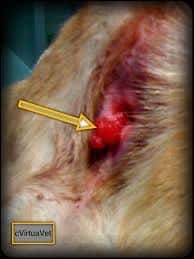Dogs can have blood on the stool for a variety of reasons. One of the most common reasons include colitis (inflammation of the colon).
Colitis can arise from several things including bacterial overgrowth, parasitism, inflammatory bowl disease, or food allergy.
Other issues that can cause blood from the rectum or feces is a foreign body,cancer and rectal polyps (typically benign tumors) that usually arise close to the anus in middle aged to older dogs.
Rectal polyps can be single, multiple, raised and / or pedunculated. Although they are benign, cancerous changes can occur. While they can occur anywhere in the gastrointestinal tract, the most common location is the rectal-anal area.
Recto-anal polyp (rectal papillary adenoma) is the most common benign tumor in the canine intestine. Middle-aged dogs (mean 7 years) are most commonly affected. Because most polyps occur within 2 cm of the anal opening, they can often be palpated (once large enough) by rectal exam. The most common presenting signs are straining to defecate and blood in the feces. Colonoscopy is recommended to ensure the disease doesn’t go further up in the colon. Treatment of choice is surgical removal.

Since there are so many causes for bloody feces, if your dog is experiencing blood, mucous and/or straining to defecate,he/she should be evaluated by your veterinarian.

In some cases the answer is immediately obvious. In other cases diagnostic testing and response to treatment is needed to find the underlying cause and see what it type of treatment it responds to.


